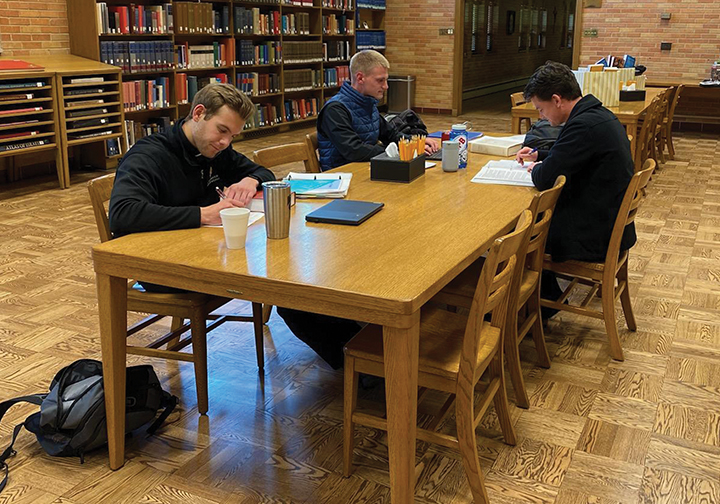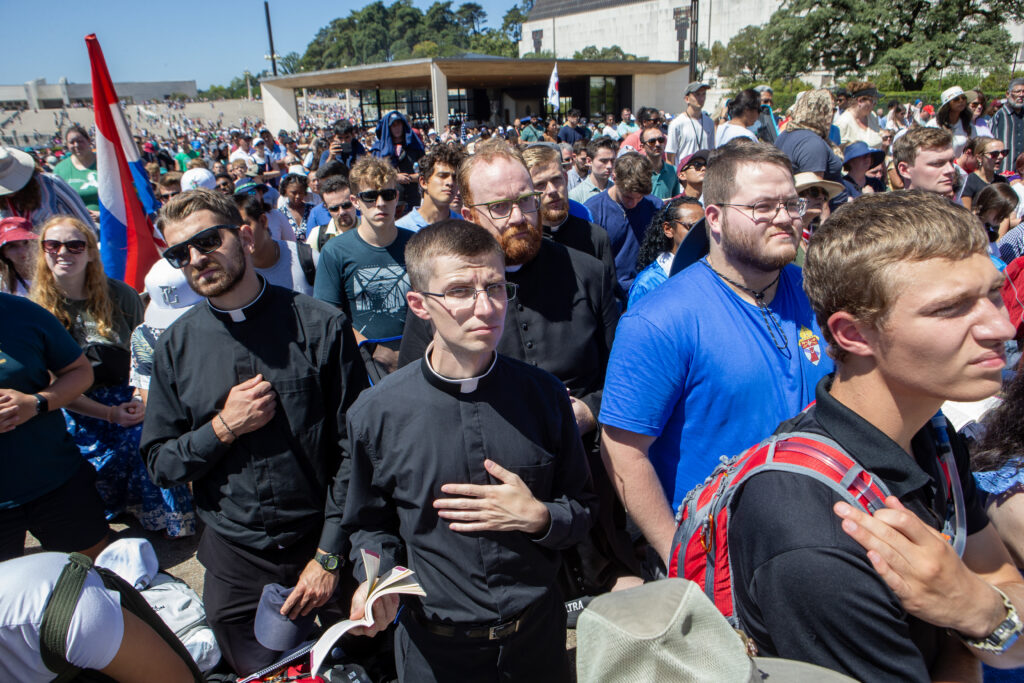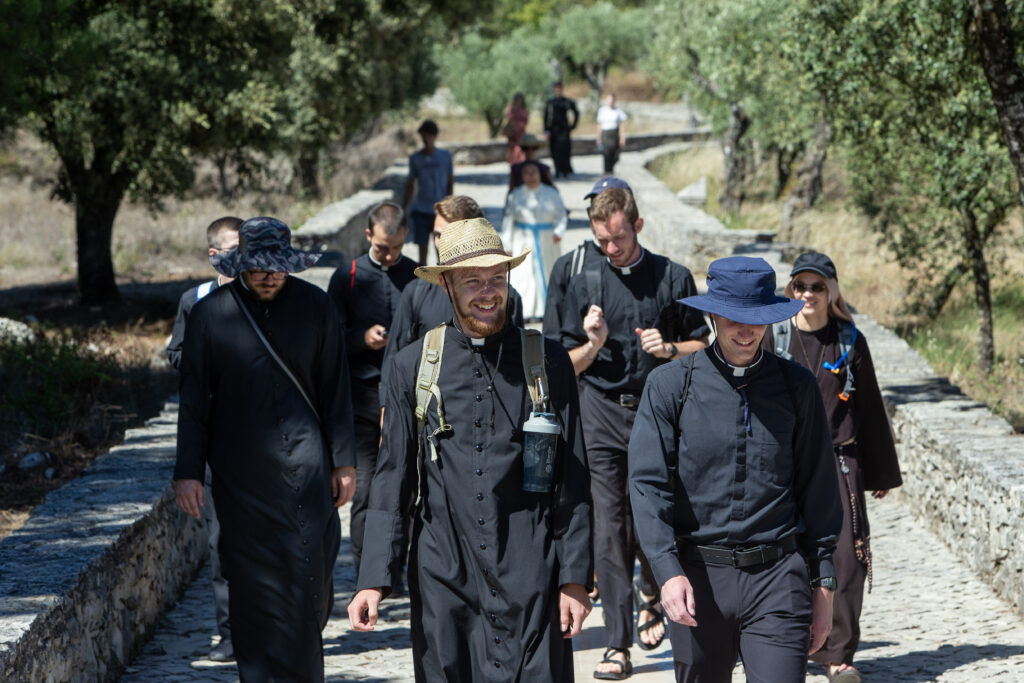
by Joe Bollig
joe.bollig@theleaven.org
KANSAS CITY, Kan. — If you look closely at the latest archdiocesan vocation office poster, you’ll see subtle but significant changes underneath the names of archdiocesan seminarians.
Gone are the words like “College II,” “Pre-Theology I” and “Theology II.”
Instead, you’ll see “Propaedeutic Stage,” “Discipleship Stage,” “Configuration Stage” and “Vocational Synthesis Stage.”
What’s up with that, you may wonder?
Archdiocesan seminarians — indeed, all seminarians around the world — are being educated and formed under a new Program of Priestly Formation (PPF). Parts of it have been around for a long time under a different name, but most of it is new.
The changes have been percolating their way down through the church bureaucracy from the Vatican Congregation for the Clergy’s 2016 revised and updated “Ratio Fundamentalis Institutiones Sacerdotalis.”
The U.S. Conference of Catholic Bishops’ Committee on Clergy, Consecrated Life and Vocations used that document to draft the new norms in 2019 and presented the new sixth edition of the PPF on June 24, 2022. Seminaries have been implementing the program since then.
“This has some of the most significant changes of any of the previous Programs of Priestly Formation,” said Father Scott Wallisch, archdiocesan co-director of seminarians.
Looking for the better
Changes in PPF are not unusual and happen every few years, said Father Dan Morris, archdiocesan vocation director.
“This is a universal mandate,” said Father Morris. “It comes from Rome. The U.S. Conference of Catholic Bishops read the proposals and as a conference makes suggestions.
“The bishops are always looking for better formation for the man’s sake and the church’s sake. They’re always looking to improve. [They ask] ‘Is this man called and do I ordain this man?’ So, anything that will help in that decision- making process is an improvement. Every version of the PPF addresses the situation of the culture and the world with the Gospel.”

The new program is designed to meet the challenges of the times.
“I would say it is in response to our current climate,” said Father Wallisch.
“It’s also in response to the abuse scandal,” he continued. “And it’s in response to the lack of formation that some men experience as they grow up. Certain things can’t be taken for granted anymore when you bring a man into seminary.
“Seminarians in the past tended to grow up in a Catholic milieu that was stronger than what many of our new seminarians experienced when they were growing up.”
Advancement by stages
There are some big differences between this latest and the previous program, said Father Morris. These include the first year Propaedeutic Stage and the ordination of transitional deacons after completion of seminary studies.
“Rather than assessing a man’s progress by years [of study] completed and formation, it is now very intentionally being based on ‘Is this man showing the marks and fruit of his relationship with Jesus Christ,” he said.
Under the new program, seminary formators ask if the seminarian is meeting such benchmarks as attaining self-possession, giving his life freely as a gift, demonstrating pastoral charity and taking ownership of his own formation.
“If the data comes back and says ‘no,’ they say this man is not ready to be ordained,” said Father Morris. “If that persists long enough, the church needs to say this man should not be ordained.”

So, what about those stages?
The first is called Propaedeutic, which lasts for one to two years. “Propaedeutic” means “introductory,” “foundational” and “preparatory.” During this time, the seminarian separates from contemporary society and is set aside for a lifestyle of prayer, work and some study.
“The two biggest components of that are to make sure their knowledge of God and self are built upon truth, so each man coming from different cultural and familial environments are purified and healed during this year,” said Father Morris.
Seminarians undergo a media and technology fast, spiritual direction and growth counseling, and different kinds of prayer. Often, seminarians describe this as their favorite year, said Father Morris.
Interestingly, something very close to the Propaedeutic State, called the Spirituality Year, has already been a part of St. John Vianney Seminary in Denver for almost two decades.
“I think the Propaedeutic Stage will help men discern better and earlier in the process to avoid men being far along in formation when they discern this isn’t what God is calling them to,” said Father Wallisch.
“I think the emphasis on being conformed to Jesus Christ — although that was already present in our seminaries — it’s nice to have verbiage attached to it, because it will keep this in front of seminarians’ eyes during their formation,” he added.
Seminarian John Donart, who entered St. John Vianney in fall 2019, is in the second year of his Configuration Stage. He, like all archdiocesan seminarians, is getting used to the new program and its new terminology. So far, he likes the new program.
“Being free from a lot of the stresses [during the Propaedeutic State] helped me grow personally and approach learning with a whole new angle,” he said. “Study becomes getting to know God better, for the greater glory of God. . . . It allowed me to enter more deeply into the year, into my vocation. I’m really grateful for that.”

The second is the Discipleship, which lasts two to three years. The emphasis during this stage is on human formation and virtue, building on the Propaedeutic Stage. The goal is growth in an intimate relationship with Christ.
Men without a college degree work toward a philosophy degree. Men with a college degree study philosophy to prepare for theology study. By the end of this stage, the archdiocese should be able to determine whether a man is called to be a priest.
The third is the Configuration, which should last a bit more than three years. During this time, the emphasis switches from vocational discernment to priestly preparation. He begins to develop skills such as preaching, celebrating the sacraments and pastoral counseling. The seminarian begins to dress like a priest.
When the Configuration Stage is completed, the seminarian’s time at the seminary is over. He is ordained a transitional deacon and then enters the fourth stage called Vocational Synthesis. During this six-month period, he serves in a parish before being ordained to the priesthood. It is similar to the former Pastoral Year.
The views from the pews
What does the new program mean in the parish setting?
“I think the parish will see it most significantly when we have deacons in a parish for six months and then are ordained priests, and possibly continue in a parish but with more faculties because of their priestly formation,” said Father Wallisch. “That will be an interesting transition for the people to navigate, getting used to someone being a deacon and then six months later, getting used to them being a priest.”
Transitional deacons will be ordained in December, while priestly ordinations will occur in June.






